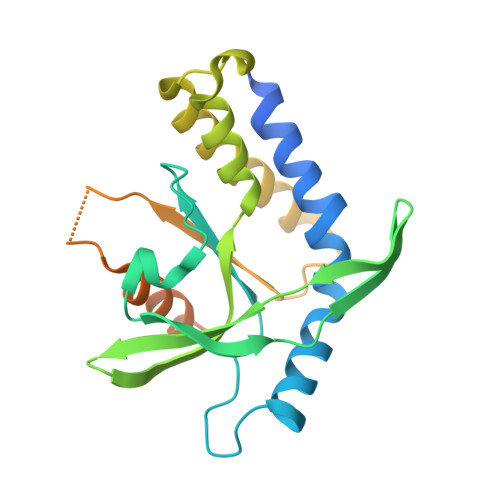Identification of Novel Carbocyclic Pyrimidine Cyclic Dinucleotide STING Agonists for Antitumor Immunotherapy Using Systemic Intravenous Route.
Vyskocil, S., Cardin, D., Ciavarri, J., Conlon, J., Cullis, C., England, D., Gershman, R., Gigstad, K., Gipson, K., Gould, A., Greenspan, P., Griffin, R., Gulavita, N., Harrison, S., Hu, Z., Hu, Y., Hata, A., Huang, J., Huang, S.C., Janowick, D., Jones, M., Kolev, V., Langston, S.P., Lee, H.M., Li, G., Lok, D., Ma, L., Mai, D., Malley, J., Matsuda, A., Mizutani, H., Mizutani, M., Molchanova, N., Nunes, E., Pusalkar, S., Renou, C., Rowland, S., Sato, Y., Shaw, M., Shen, L., Shi, Z., Skene, R., Soucy, F., Stroud, S., Xu, H., Xu, T., Abu-Yousif, A.O., Zhang, J.(2021) J Med Chem 64: 6902-6923
- PubMed: 34000802
- DOI: https://doi.org/10.1021/acs.jmedchem.1c00374
- Primary Citation of Related Structures:
7KVX, 7KVZ, 7KW1 - PubMed Abstract:
Stimulator of Interferon Genes (STING) plays an important role in innate immunity by inducing type I interferon production upon infection with intracellular pathogens. STING activation can promote increased T-cell activation and inflammation in the tumor microenvironment, resulting in antitumor immunity. Natural and synthetic cyclic dinucleotides (CDNs) are known to activate STING, and several synthetic CDN molecules are being investigated in the clinic using an intratumoral administration route. Here, we describe the identification of STING agonist 15a , a cyclic dinucleotide structurally diversified from natural ligands with optimized properties for systemic intravenous (iv) administration. Our studies have shown that STING activation by 15a leads to an acute innate immune response as measured by cytokine secretion and adaptive immune response via activation of CD8+ cytotoxic T-cells, which ultimately provides robust antitumor efficacy.
Organizational Affiliation:
Drug Discovery Sciences, Takeda Pharmaceuticals International Company, 9625 Towne Centre Drive, San Diego, California 92121, United States.



















